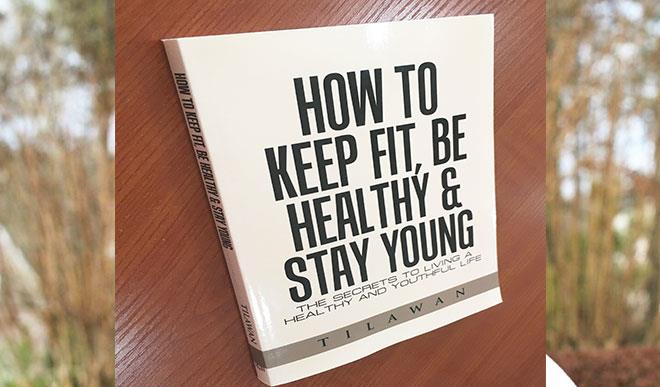Warning: Reading this book will make you healthier
Title: How to Keep Fit, Be Healthy and Stay Young Author: Colonel S S Tilawan Publisher: Author House Pages: 222 Reviewer: Abdulkareem Baba Aminu Colonel Suleman Saidu Tilawan’s book opens cautioning those who pay little attention to what they eat, yet spend time, money and energy in the gym to shed weight. So while one […]


Title: How to Keep Fit, Be Healthy and Stay Young
Author: Colonel S S Tilawan
Publisher: Author House
Pages: 222
Reviewer: Abdulkareem Baba Aminu
Colonel Suleman Saidu Tilawan’s book opens cautioning those who pay little attention to what they eat, yet spend time, money and energy in the gym to shed weight. So while one does some exercise, it’s only logical to also watch what’s taken in food-wise. In other words, prevention is better than cure, for time not spent keeping fit will be given to shedding fat built up over time.
The sight of overweight people isn’t always good, the book reveals. Their self-esteem, too, apparently. The author goes on to explain how physical fitness affects the mind and spirit by making one emotionally and psychologically stronger. Quotes by persons such as Terry Dorian, a renowned physical fitness trainer and JF Kennedy are generously used to illustrate or reinforce points.
But how does it boost one’s confidence, if at all? Sharing from a film he has watched is a tool this writer effectively utilises – a debate scenario where one partner works at building the other’s confidence first through physical training. But the other wondered what it had to do with his performance at the debate, which they later won. With this story, he illustrates the importance of physical fitness and its effect on the spirit and confidence of a person and wrote that it has been proved that regular exercises serve to strengthen the power of the brain. Apart from reducing stress by preventing damage to the brain, exercise pumps high levels of the hormone cortisol which damages the hippocampus part of the brain responsible for turning short-term memory into long-term memory, he explains and goes on to recommend exercises such as yoga, a simple walk in the park, gardening and even a massage.
Again this book drops another bombshell: A good diet without exercise is not good enough. One may play safe but not reach the optimal health level due to lack of exercise. He writes: “As you watch what you eat, you need to also watch how you exercise, and quickly recommended an exercise program which will do the following: Increase energy levels, relieve stress and anxiety, protect from injury, make for a good posture, relieve digestive disorder, and enhance self-image among other benefits.”
Exercise is one of the things individuals may easily procrastinate, and the writer points at those needed to achieve optimal health, such as cardiovascular exercise, strength and resistance training and flexibility training, and insists that any program for optimal health is incomplete without them.
However, leaving no stone unturned, the author advises readers to evaluate themselves and be sure about the sort of exercises they need, including the condition in which they should work out. For example, he advises on drinking a lot of water to avoid dehydration, work out in an airy environment to avoid heatstroke, and also exercise moderately in order not to over-strain the muscles.
Many people may run to the gym after reading this book. On page 49, it reads:
“Regardless of your sex or age, as you grow older it is important that you devote at least fifteen to twenty minutes to strength training and for no less than two or three times a week. This is to develop your muscles. To be at optimal health you need muscle mass because muscle is critical to body weight control. Muscle is the best calorie tool the body has. Unlike fat, muscle burns calories even when we are resting. It burns calories 24/7. Therefore the more muscle you have the more calories you burn and the more weight you shed. Muscle quickly burns your daily calorie intake and stops you from adding weight. You cannot really control your weight by dealing only on aerobic exercises, you need strength building too so that you build muscle.”
Another shocker is for those who believe staying off food will help them maintain body weight. Again, this book says no, food is important because it gives the amount of calories that’s important to maintaining the right body weight. All one needs is to know how much to eat. The math is, if one takes in more calories than what’s burned, there lays the problem.
Reading this three-part work makes for deep reflection, the kind that makes one imbibe careful eating habits and a switching-back to that old exercise that one may have thought is now unnecessary. And then there are the health tips that will continue to be a reminder, insight into why women age faster than men and so on. However, a nagging feeling persisted, that something is missing. The book might have benefited immensely from a few illustrations here and there, to enhance the message.
While this reviewer has many good intentions, including regular visits to the gym and healthier eating choices, they have remained only intentions. After reading the first part of Tilawan’s book, I found myself indulging in self-caution, scolding myself that reading it will indeed make me healthier.
